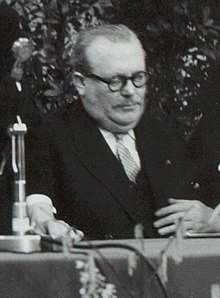Social Pact
Concluded in secret in German-occupied Belgium on 24 April 1944, the Plan was intended to lay the foundations for a new political compromise between the different groups after the war based on improved labour relations.
It is most notable for laying the foundation for the country's social security legislation adopted by the government of Achille Van Acker in December 1944.
The pact was concluded in secret on 24 April 1944 while Belgium was still under German occupation as labour and company leaders prepared for the period of reconstruction which would follow liberation by the Allies.
The agreement was conducted unofficially and independently of the Belgian government in exile and never achieved any official status, but remained an influential document on post-war politics.
[3] According to historian Martin Conway, "the real significance of the Pact lay not in the vision it presented of a new era of social welfare but rather in the way in which its preparation demonstrated the degree of common ground that had emerged during the Occupation" between different interest groups.
